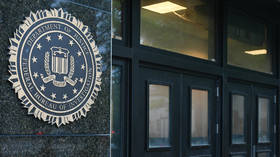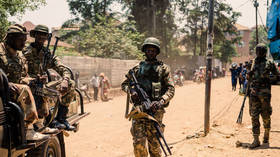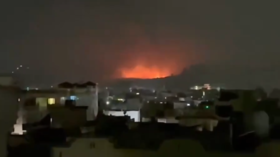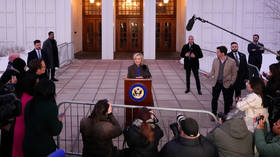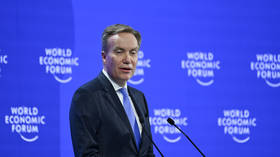Tables turning: Al-Qaeda pushing Syrian opposition back to Assad?
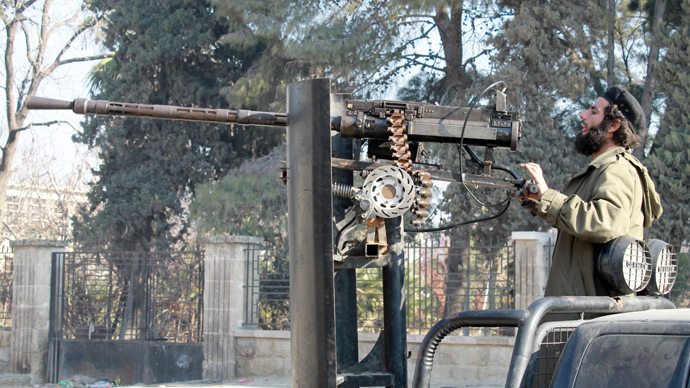
With Al-Qaeda’s and Al-Nusra’s growing influence in the region, Syrian opposition is having second thoughts about being opposed to Bashar Assad, security analyst, Michael Maloof, told RT.
RT:The US and Iran have been propping up different sides in the Syrian conflict but there is a chance that they actually could be working on the same side in Iraq. Is there any possibility of them actually working across the table this way?
Michael Maloof: I think it is going to increase because of what we would refer to as a ‘common enemies’ approach. The common enemy would be the foreign fighters, the Sunni Islamist militants who are fighting in Syria and that is spilling over into Anbar, a predominantly Sunni-controlled area in Iraq. And this has been a problem with, I think, the US, as well as Iran [who] recognize that if Bashar Assad did not stay in power or if he is weakened, then Syria could become another base like Pakistan and Afghanistan before, to be used as a springboard to go to the other countries.
Iraq is certainly now under siege once again by Al-Qaeda; and they have made it quite well-known, their element out there is of course ISIL (Islamic State of Iraq and the Levant), which is actually an invention of Al-Qaeda in Iraq. They have been fighting in Syria, now they are coming back to Iraq and they are beginning to spread. And we can also see now the spread of ISIL alongside Al-Nusra that has been shooting and blowing car bombs in Lebanon. The branch now is not only in Iraq but in Lebanon, and as long as they can use Syria as a base, they are going to do this. They are also going to Turkey. This portrays a very serious problem. If go back to the original question, the US is now beginning to see Iran as an element here; they are going to need help from not only in Iraq, but once the US troops pull out of Afghanistan, Iran’s presence and influence is going to be extremely important to US interests.
RT:Let's go back to the situation in the region. Since at least 2001, Al-Qaeda and Al-Qaeda-linked groups have been a kind of public enemy number one in the US. Why now we see that resurgence more than ten years later?
MM: I think it’s because of the instability that was produced when we left Iraq. We basically created another power vacuum that they have just swooped right back in. Once we leave Afghanistan, the Taliban, which is related to Al-Qaeda, will be doing the very same thing. They are actually growing, the whole Taliban, the whole Al-Qaeda movement is stronger than it has ever been, contrary to what President Obama initially said that they were on the ropes, that they decimated. That’s not true. And when you look at over time the extent to which Al-Qaeda has branched up from the Arabian Peninsula to Northern Africa, to the Maghreb, and also now into Russia using the Chechens there, it’s a very serious development in terms of their growth over time and because it’s evolutionary we don’t see it; it’s not a one big event. So this is emerging as an increasingly serious problem in terms of Al-Qaeda spread and it’s getting worse. It is all done at the behest of the Saudis, they are controlling all of this. It is well-known that Prince Bandar can switch them on and switch them off like a light switch.

RT:Surely all these Al-Qaeda linked groups can't be rising on their own, without some power supporting them. So who are their backers?
MM: Well, the rise is due primarily to the fact that the opposition that we were supporting just was not strong enough and we did not give them the weapons they needed. So consequently, the foreign fighters came in and basically took over the opposition. So now you have Prince Bandar of Saudi Arabia pushing the US to back its Islamic Front, which is comprised of some 75,000 troops and have about a dozen different Islamist, extremist groups within Syria.
What’s ironic is that that’s not just the Saudis who are pushing the US to support this so-called moderate group, but also the Israelis. But what we’ve discovered is that in most cases these groups aren’t at all moderate. They were actually involved in attacking the Free Syrian Army's depots recently and taking all their weapons. They have actually been battling with FSA as a consequence.
So the US and the Europeans are basically backing off from a little bit of support for the opposition and certainly because of inability to distinguish the different elements within the opposition. And what will happen if we start to pass weapons to the opposition? They inevitably would fall into the hands of extremists because in addition that they are more radicalized, they are also more fierce fighters and that they have shown against the original Syrian opposition.
RT:Have you seen US policies having an effect on the now-flourishing Islamist movement in Syria and Iraq?
MM: Yes, I do. Because we didn’t go after the real threat. And the real threat is these foreign fighters that Prince Bandar and the Saudis have introduced into Syria. I know that Bashar Assad has many issues and many problems but he was also for reforms. He is also the only individual who could actually protect the minorities that we have in the country. Even the Syrian opposition now is having second thoughts about being opposed to him. And some in the US are even suggesting that the Free Syrian Army should rejoin the Syrian Army and fight Al-Qaeda because Al-Qaeda along with Al-Nusra is regarded now as the main threat not just to Syria but to the region. And I think the US also views Al-Qaeda as the main threat. That’s why the US is no longer pushing for regime change in Syria. And I think that’s an important development.
RT:How do you see the situation evolving? Is there a danger of a much bigger conflict for the whole region?
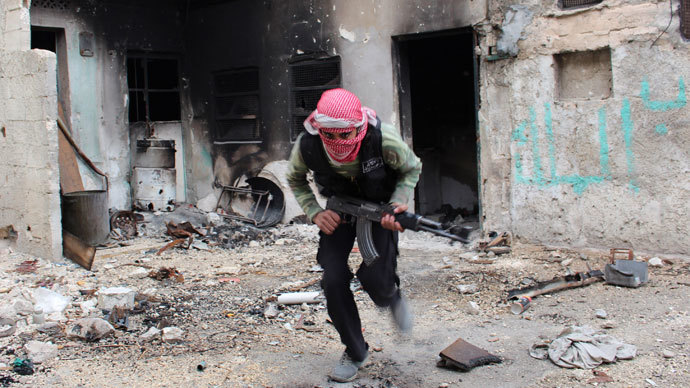
MM: It’s a never ending battle because Al-Qaeda has now become stronger. The fact that we pulled out entirely and the fact too that the Iraqi government was never capable of fighting the foreign fighters, the Al-Nusra types and the ISIL types, I think is indicative of the problem that we are seeing today. We are going to see this in Syria as well if Assad is overthrown. They just don’t stop, their goal is to set up Caliphates, strict Sharia law on anyone who is not with them, they are infidels and they are going to kill them. That’s what we are seeing. And certainly this is a further manifestation of the Saudi-proxy war with Iran, not only in Syria what we’ve seen but now we can see this in Iraq. I think the Iranians see that as a major threat. And the US is realizing the same thing. This is actually why they are giving assistance to the government of Iraq, whose Prime-Minister is a Shi’a and has close ties with Iran.
RT:How did it happen that extremists become so strong and well-equipped?
MM: It’s an indirect form of support that has led to this because the US provided little assistance through Jordan, through the CIA and through Turkey. But the opposition is fragmented, incapable and what’s happened is that the more radical elements, principally the foreign fighters, have taken over the opposition in terms of the fighting and consequently they got better weapons into their hands, they got surface-to-air missiles, they got RPGs and as a result it gave them a force multiplayer to be able to fight successfully not only against Bashar Assad, but now to extend itself back into Iraq, whose forces are not capable of withstanding the onslaught of Al-Nusra and ISIL. That's why you see the US providing renewed assistance to the Al Maliki government in Iraq, but it is probably going to be too little too late. It may mean that the US is going to have to introduce some US troops back in order for training, and so we may begin to see the evolutionary process of the US beginning to move back into Iraq at least for a period of time.
And that’s only because of the way events are evolving, it’s pushing US policy. The US is no longer in control of its own foreign policy. The fact that we just pulled out and did not keep troops there to train and maintain their presence is what led to that power vacuum and the ability of Al-Nusra and Al-Qaeda to be able to move back into Iraq successfully, particularly into Anbar province, which is a Sunni-dominated area, so that’s all is going to be controlled. And they also use that province as a springboard to launch attacks back in Syria. So it’s going to be a problem worse that we have seen in Pakistan and Afghanistan.
The statements, views and opinions expressed in this column are solely those of the author and do not necessarily represent those of RT.
The statements, views and opinions expressed in this column are solely those of the author and do not necessarily represent those of RT.



